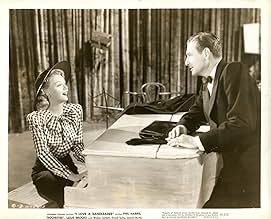Füge eine Handlung in deiner Sprache hinzuAs house painters Newton H. Newton and Phil Burton remodel the Club Monterey on Broadway, owner Gibley auditions acts for his club's reopening. Theatrical agent B. Templeton Jones brings his... Alles lesenAs house painters Newton H. Newton and Phil Burton remodel the Club Monterey on Broadway, owner Gibley auditions acts for his club's reopening. Theatrical agent B. Templeton Jones brings his client, aspiring singer Ann Stuart, to try out for a spot, and when Gibley doesn't hire h... Alles lesenAs house painters Newton H. Newton and Phil Burton remodel the Club Monterey on Broadway, owner Gibley auditions acts for his club's reopening. Theatrical agent B. Templeton Jones brings his client, aspiring singer Ann Stuart, to try out for a spot, and when Gibley doesn't hire her, Ann becomes discouraged. When Phil, who has watched Ann perform from his ladder, enter... Alles lesen
- Regie
- Drehbuch
- Hauptbesetzung
- Newton H. Newton
- (as Rochester)
- The Jordan Sisters
- (as The Four V's)
- Singer
- (Nicht genannt)
- Maid
- (Nicht genannt)
- Tony Ramon - Bandleader at El Caro
- (Nicht genannt)
- Wardrobe Man
- (Nicht genannt)
- Lucy - Willie's Dog
- (Nicht genannt)
- Newspaper Reporter
- (Nicht genannt)
- Counter Man
- (Nicht genannt)
- Miss Tilson
- (Nicht genannt)
- Policeman
- (Nicht genannt)
- Madge
- (Nicht genannt)
Empfohlene Bewertungen
Harris is no singer, but he does talk a good tune, especially his signature rendition of "That's What I like About the South". Brooks nicely warbles, or at least lip-synchs, a couple of forgettable numbers, while Anderson entertains humorously as Newton B. Newton, bodyguard and agent extraordinaire. And that's about it, except for the slender plot, which unfortunately becomes too heavy during the last third, bringing down the former verve and uplift. In fact, this may be the only movie musical, major or minor, not to end the proceedings with a bang-up production number. Oddly, the ending is more like the producers suddenly ran out of film or script or something.
In passing-- James Burke was a familiar face from that era, usually as a cop or slightly dense official of some type. Here he plays Charles Gibley, owner of the nightclub. Watch him tilt back his head and deliver a withering squinty-eyed stare at any and all who are trying to hustle him. It's really a priceless bit of business. There were many of these distinctive "types" like Burke who performed unforgettably over the years, but whose names were generally unknown and their passings generally unnoticed. God bless them all.
It turns out that Aunt Mata, who was a pianist, was not the musician on keyboard in film (much to my dismay). My family has a copy of a promo studio photo of The Four Vees, showing my great aunt & other three musicians that were in movie. I'd like to know if there's a way for me to send copy of photo to attach to the group's name. Thanks M.A.
The stale amnesia angle doesn't help either, but there it is. Harris and his assistant Eddie "Rochester" Anderson are painters doing a job at a nightclub. Harris tries to help in his small way with struggling singer Leslie Brooks, and clumsily falls on his head in the process and takes the ol' amnesia route. By circumstance and guesswork he's made to believe he's actually a bandleader. Oddly enough, he's got an innate talent for it and becomes a success -- and Anderson, even though he knows Harris is really a painter, attaches himself as a Man Friday in order to ride along on Harris' bandleader success. Brooks plays an angle as well, but falls in love with him in the process. There's a few more contrivances, a few more musical numbers, and a predictable finish. There's also a quick joke where Harris as his screen character makes fun of the real Harris as a bandleader. Actually, the only reason to watch this film is to catch the always pleasing Eddie Anderson. Obviously his race kept him from being the star of this movie, and that's too bad because he's the only one of Jack Benny's cast members who could carry a film -- and he certainly could have carried this one. Instead it's Harris who fills the screen (almost literally considering his bulk). Nonetheless, it's a pleasant little movie that's easy on the brain... but hard to see considering its virtual unavailability.
While this movie led no place in particular for anyone's career -- Harris and Rochester went back to radio, Del Lord back to the shorts department and the rest of the cast went on doing whatever it was they did, there are a lot worse movies out there taking up more of your time for less effect.
Wusstest du schon
- WissenswertesBarbara Ames's debut.
- SoundtracksSobre las olas (Over the Waves)
(uncredited)
Music by Juventino Rosas
Played during the specialty dance audition
Top-Auswahl
Details
- Laufzeit1 Stunde 10 Minuten
- Farbe
- Seitenverhältnis
- 1.37 : 1
Zu dieser Seite beitragen



















